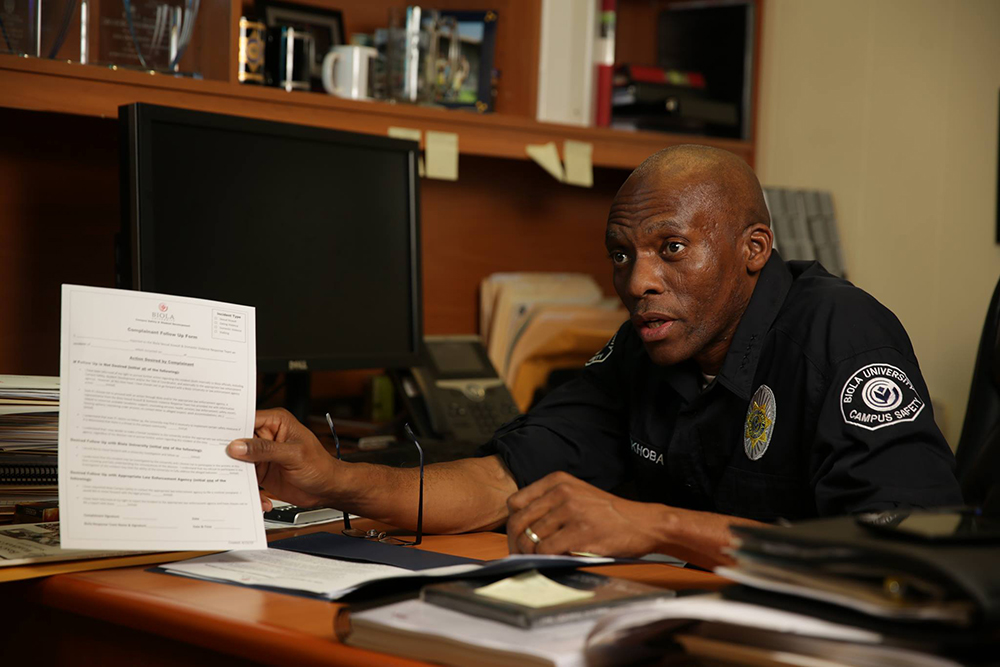Since Biola’s Sexual Assault Crisis Response team formed six months ago, Campus Safety has devoted hours of work in an attempt to understand sexual assault violations more thoroughly.
Chief John Ojeisekhoba of Campus Safety helped implement several pathways through Biola’s Human Resources and Student Development departments in order to ease reporting any reports of sexual assault. The protocol for the complainant filing the report is plain and thoroughly comprehensive, with Campus Safety walking with them through the process of reporting.
due diligence
“Part of our due diligence is obviously ensuring that the complainant is safe,” Ojeisekhoba said. “And also, keeping in mind that other students may be at risk. So sometimes we have to take swift action.”
The swift actions needed in these circumstances involve Campus Safety receiving a comment from the accused person or persons, as well as gathering all necessary data. While sexual assault investigations are geared toward assisting and aiding the victim’s concerns, the accused has a right to be heard, Ojeisekhoba emphasized. Too often, victim blaming begins when the report filed by the complainant is not handled properly by the on-campus police.
“Not that we get one-sided and gang up on somebody. We don’t pick on anybody. But we want to hear from the accused as well,” Ojeisekhoba said. “It’s only fair to get two sides. Getting the accused side is not saying the complainant is lying.”
maintaining the safety of students
Campus Safety put measures in place to maintain the safety of students and defuse the situation until all information becomes available. The response team exists to better nullify and handle the situation, though individual officers and members of Campus Safety have the capacity and training to initially manage it themselves.
“My officers can handle sexual assault cases when it calls but a sexual assault response team, from my department, I head it, and I have two investigators,” Ojeisekhoba said. “[They are] a part of our core team that play a role in managing the situation from the get-go. Because in a sexual assault situation and some other crimes, you have to get it right.”
The unique concern Biola’s Campus Safety has in protecting students is also the reality of the Christian student’s fear to report. Campus Safety has previously received reports from six months to several years in the past, and then must swiftly act to retrieve all available stories and information from the reporting and accused parties. Ojeisekhoba encourages students to report all concerns or events that may threaten other students as well as those who have only threatened themselves.
campus-wide cooperation
According to Campus Safety regulation, if an assault occurs on campus, the amount of people involved in the investigation are limited to whoever the complainant desires to be involved. While the Chief is obligated to inform the La Mirada Police Department a violation has occurred, the LAPD has no grounds on which to get involved unless the complainant seeks their involvement.
April is Sexual Assault Awareness Month, and since last year, campus-wide cooperation has become drastically more complex. If the complainant is a student, Ojeisekhoba said, Campus Safety will cooperate with Student Development. Should the complainant be an employee, then procedure demands Human Resources.
“If the suspect poses a risk to other students, we may need to put a more timely [investigation] in, especially if the suspect is another student,” Ojeisekhoba said. “Nine out of 10 times, I will write a no-contact letter to the accused, [saying] you can’t contact them. Directly, indirectly, through a third party, electronically.”
gravity of sexual assault
The gravity of sexual assault is weighty, and the psychological implications can affect a student for the remainder of his or her life. Due to the nature of the crime, Campus Safety said they are devoted to learning how to make complainants feel safe and secure in reporting any violation, more so than other crimes on campus.
“What my team and I do, and Student Development: we never blame the complainant. Never ever. We have to get to the bottom of it, we have to show compassion, we have to show empathy, and we gather all the facts and go from there,” Ojeisekhoba said. “You’re not dealing with a thing, you’re dealing with a person.”







